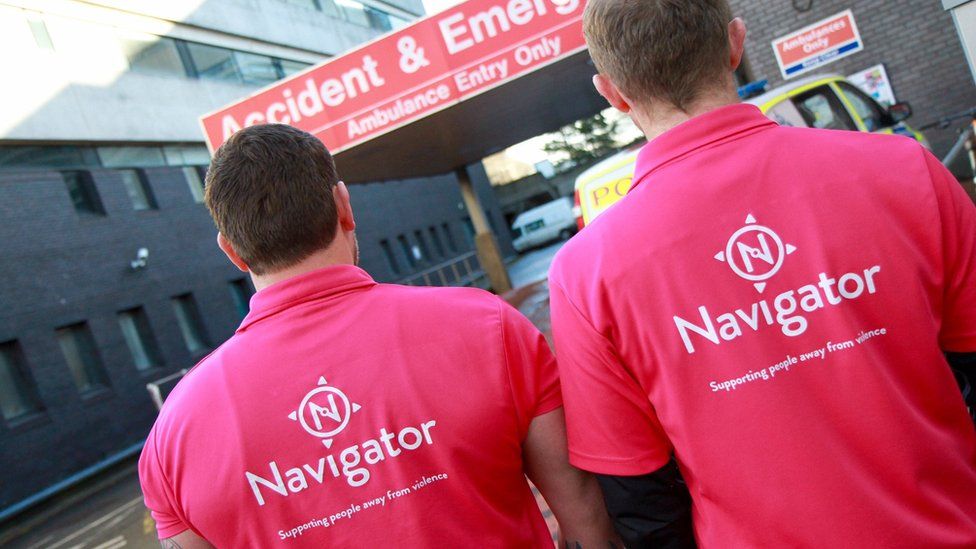Scheme to tackle A&E violence introduced in Glasgow
- Published

A project to tackle violence in A&E departments, thought to be the first of its kind in the UK, has been introduced in Glasgow.
The Navigators Scheme, funded by Police Scotland's Violence Reduction Unit, has been operating at Glasgow Royal Infirmary (GRI) since December.
It involves two navigators establishing a connection with people who are victims or perpetrators of violence.
They later discuss the agencies and services that can help them.
This could include relationship counselling or putting them in touch with organisations such as Alcoholics Anonymous or Shelter.
The Navigator scheme is the first to be available for anyone being treated in an accident and emergency department.
But a charity in London called Redthread has been running hospital-based violence intervention programmes specifically for young people for the past 11 years
'No violent o'clock'
Doctors at the GRI said the project was one of the most important innovations they had seen in decades.
They hope the scheme can be rolled out to A&E departments across Scotland.
Senior consultant, Donogh Maguire, said it was possibly the most valuable non-medical change in the management of A&E in the whole course of his career.
"I think for inner-city hospitals, this should be a standard means of engaging with the homeless and disenfranchised people that we have coming to our departments," he said.
"The reason I say this is because the current mechanisms are failing or the people are not engaging with them, whereas here we're getting the navigators catching people at a time when they're amenable to some intervention."
One of the navigators, Alan Gilmour, said the work was highly unpredictable.
"We don't know what's coming in, we don't know what's happening," he said.
"I mean, there's no 'violent o'clock'. We begin our shift and we just wait or find out if there's anyone in and if there's not we wait around for that to happen."
By James Shaw, BBC Scotland
It's after 10pm on a Thursday in the accident and emergency department at Glasgow Royal Infirmary. Tam Begbie is sitting on the hard vinyl floor talking to a young woman with peroxide blonde hair slumped in a chair in front of him.
In the hubbub of an A&E starting to get busier as the night goes on, no-one else can hear the substance of their conversation. But that is as it should be.
Tam is not talking to the woman to explain her treatment or to find out if she's committed a crime. He is simply trying to help. Because as a navigator, that is his job.
The agencies behind this scheme are Police Scotland's Violence Reduction Unit and the doctors' group, Medics Against Violence.
They decided on the job title, navigator, because it describes the aim of the role, which is to help people steer their way through the agencies that might be able to help them escape the lifestyles that are making them victims and possibly perpetrators of violence.
Tam discovers the young woman with the broken wrist got the injury in a fall. It might have happened during an argument with her boyfriend.
He is now in the reception area, wanting to see her. Tam might decide that it is not safe for them to get together at this point.
'Transformative effect'
But he will advise the young woman that he can meet her to talk about her situation tomorrow or the day after. Maybe in a cafe or fast food restaurant - wherever she feels comfortable.
He will suggest places where she might seek help. It might be relationship counselling or Alcoholics Anonymous. Or Shelter if she needs to find somewhere new to live to escape an abusive relationship.
The genius of the navigator concept is that it offers help to people in the direst need at exactly the time when they might be most ready to make a change.
And it recognises that doctors and police officers cannot always offer permanent solutions to deep-rooted problems.
The value of the scheme is fully acknowledged by the head of A&E at Glasgow Royal Infirmary, Alastair Ireland. He allowed the navigators in last December and has seen the difference they can make.
At the moment, this is just a small pilot scheme, but doctors at the GRI agree that having navigators in every A&E in Scotland could have a transformative effect on the problems of violence they and the rest of society have to deal with.
- Published4 January 2015